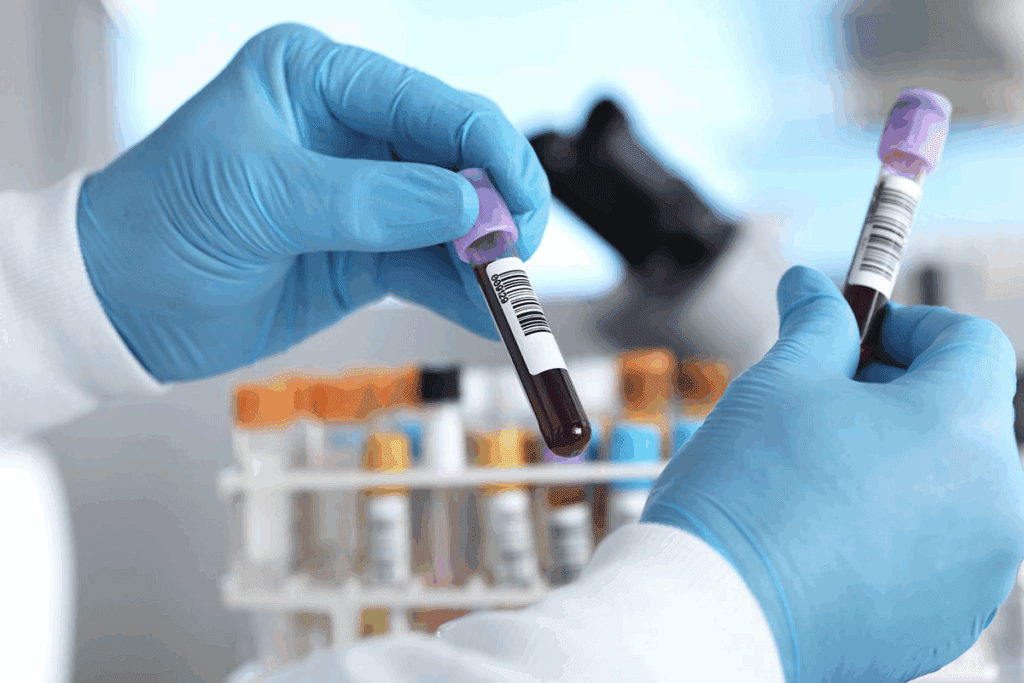
Did you know that over 100 million Complete Blood Count (CBC) tests are done every year in the U.S.? It’s one of the top blood tests for checking health and finding diseases. CBC Illness Detection: The Amazing Secrets in Your Blood shows how a CBC test looks at different parts of the blood, like red and white blood cells, hemoglobin, and platelets.
This test is key in finding diseases like anemia, infections, and leukemia. It helps doctors start treatment early. By looking at CBC test results, doctors can understand a patient’s health better. This makes it a must-have for regular health checks.
Key Takeaways
- A CBC test is a common diagnostic tool used to evaluate overall health.
- It measures various blood components, including red and white blood cell counts.
- CBC analysis helps detect medical conditions such as anemia and infection.
- Early detection through CBC testing enables timely medical intervention.
- The test is a critical part of routine health checkups and medical diagnosis.
What is a Complete Blood Count (CBC)?
The Complete Blood Count (CBC) test is a key test that checks different parts of blood. It helps doctors understand a person’s health. This test is important for finding and tracking many health issues.
Definition and Purpose
A CBC test looks at three main blood cell types: white, red, and platelets. It helps doctors see how well the body is working. This includes spotting problems like anemia, infections, and leukemia.
Doctors often use the CBC test during yearly check-ups or when symptoms appear. It helps them understand how the body reacts to sickness and injury.
Components of a CBC Test
A standard CBC test checks several important blood parts, including:
- White Blood Cell (WBC) count and differential
- Red Blood Cell (RBC) count and indices
- Platelet count
These parts give a full picture of the blood cells. Here’s what each part means:
| Component | Description | Significance |
| White Blood Cell (WBC) count | Measures the total number of WBCs | Helps detect infection or inflammation |
| Red Blood Cell (RBC) count | Measures the total number of RBCs | Assesses oxygen delivery to tissues |
| Platelet count | Measures the total number of platelets | Evaluates blood clotting ability |
By looking at these parts, doctors can better understand a patient’s health. They can then decide on the right tests or treatments.
The Science Behind CBC Illness Detection

To understand how CBC detects illnesses, we need to know about blood cell analysis and lab methods. The Complete Blood Count (CBC) is a detailed test. It checks different parts of the blood to see how healthy a person is.
Blood cells are key to keeping us healthy. Their analysis can show problems that might mean we’re sick. The CBC test looks at the blood cells’ count, shape, and other features. This helps find health issues early.
How Blood Cells Reflect Health Status
Blood cells show our health through their count, shape, and other details. For example:
- White Blood Cell (WBC) Count: Too many WBCs might mean we have an infection or inflammation. Too few could mean our immune system is weak.
- Red Blood Cell (RBC) Count: Problems with RBC count or shape can point to anemia, blood loss, or other issues with red blood cells.
- Platelet Count: Changes in platelet count can signal bleeding disorders, bone marrow problems, or other health issues.
Laboratory Methods Used in CBC Analysis
Labs use automated hematology analyzers for CBC tests. These tools give quick and accurate results. They:
- Count and check blood cells using electrical and optical methods.
- Give detailed reports on blood cell parameters, helping diagnose health issues.
- Make CBC testing faster and more accurate, helping doctors act quickly.
The use of automated CBC analysis has greatly helped in finding and treating illnesses. Advanced lab methods help doctors make better decisions with reliable CBC results.
Key Components Measured in a CBC

The CBC test looks at several important parts of blood. It gives insights into the immune system, how oxygen is delivered, and clotting. These parts are key to diagnosing health issues and checking overall health.
White Blood Cell Count and Differential
White blood cells (WBCs) are essential for fighting infections. A CBC test checks the total WBC count and breaks it down into different types. This includes neutrophils, lymphocytes, monocytes, eosinophils, and basophils.
An abnormal WBC count or differential can show infections, inflammation, or leukemia. For example, a high neutrophil count often means a bacterial infection. An increased lymphocyte count can point to a viral infection.
The differential count helps doctors pinpoint the exact infection or condition affecting a patient.
Red Blood Cell Count and Indices
Red blood cells (RBCs) carry oxygen throughout the body. The CBC test looks at the RBC count, hemoglobin level, and hematocrit. It also checks RBC indices like mean corpuscular volume (MCV) and mean corpuscular hemoglobin concentration (MCHC).
These indices help diagnose different types of anemia. For instance, aow MCV points to microcytic anemia, often from iron deficiency. A high MCV suggests macrocytic anemia, possibly from vitamin B12 or folate deficiency.
Understanding these indices is vital for diagnosing and managing anemia and related conditions.
Platelet Count and Function
Platelets are small blood cells that help with blood clotting. The CBC test measures the platelet count. This can help diagnose conditions like thrombocytopenia (low platelet count) or thrombocytosis (high platelet count).
Abnormal platelet counts can raise the risk of bleeding or clotting disorders.
“Platelet count is an essential parameter in assessing the risk of bleeding or thrombotic disorders. An abnormal count can signal underlying conditions that require further investigation.”
Common Illnesses Detected Through CBC Testing
CBC testing is key to finding many health issues. It looks at blood parts to see how well a person is doing. Doctors use this info to check on a patient’s health.
Infections and Inflammatory Conditions
A CBC test checks for infections and inflammation. It looks at white blood cells. If there are more white blood cells, it might mean there’s an infection or inflammation.
Bacterial infections usually make white blood cells go up more than viral infections.
Blood Disorders and Anemias
CBC testing is also important for finding blood disorders and anemias. It looks at red blood cells, hemoglobin, and hematocrit. This helps find iron deficiency anemia.
It can also show other anemias, like vitamin B12 deficiency anemia.
Potential Cancer Indicators
CBC results can hint at some cancers, like leukemia. If white blood cells are odd or there are blast cells, it might mean leukemia. But a CBC alone can’t say for sure if there’s cancer. It just means more tests are needed.
In short, CBC testing is a big help in finding illnesses. It spots infections, blood disorders, and even hints at cancer. Doctors use CBC results to decide what tests and treatments are needed.
Anemia Detection and Diagnosis
Understanding anemia diagnosis through CBC testing is key to good patient care. It shows what causes anemia. A Complete Blood Count (CBC) test checks the blood’s parts, like red and white blood cells, and platelets.
Anemia means not enough red blood cells or hemoglobin. This makes it hard for tissues to get oxygen. The CBC test is vital for finding anemia by looking at hemoglobin, hematocrit, and red blood cell sizes.
Iron Deficiency Anemia
Iron deficiency anemia is common worldwide. It happens when the body doesn’t have enough iron for hemoglobin. The CBC test spots this by looking at low hemoglobin, small red blood cells, and less hemoglobin in each cell.
Key signs of iron deficiency anemia in CBC results are:
- Low hemoglobin levels
- Small red blood cells (microcytic)
- Less hemoglobin in each cell (hypochromic)
Vitamin B12 and Folate Deficiency
Vitamin B12 and folate shortages cause megaloblastic anemia. This is when red blood cells are too big. The CBC test finds this by seeing big red blood cells and high MCV.
For vitamin B12 and folate deficiency anemia, CBC results show:
- Big red blood cells (macrocytic)
- Big red blood cells and sometimes very segmented neutrophils
Other Types of Anemia
CBC testing also spots other anemias like anemia of chronic disease, hemolytic anemia, and aplastic anemia. Each has its own CBC signs that help doctors diagnose.
Anemia of chronic disease often has normal-sized red blood cells. Hemolytic anemia shows high LDH and indirect bilirubin, along with CBC signs.
In summary, the CBC test is a key tool for finding and diagnosing anemia. It lets doctors see the different types of anemia and start the right treatment.
Identifying Infections Through CBC Results
CBC test results are key in spotting infections. They show how the body fights off bacteria or viruses. The white blood cell count is a big part of this analysis. It helps doctors figure out if you have an infection.
Bacterial vs. Viral Infection Patterns
A CBC test can tell the difference between bacterial and viral infections. It looks at the white blood cell count and types. Bacterial infections raise neutrophils, while viral infections raise lymphocytes.
Other signs in the CBC test can also point to infections. For example, a high white blood cell count with more neutrophils might mean a bacterial infection. A high lymphocyte count could mean a viral infection.
Chronic Infection Indicators
Chronic infections can also show up in CBC results. If your white blood cell count stays high or other blood parts look off, it could mean you have a long-term infection or inflammation.
The table below shows common CBC findings for different infections:
| Infection Type | CBC Findings |
| Bacterial Infection | Increased neutrophils, elevated WBC count |
| Viral Infection | Increased lymphocytes, normal or slightly elevated WBC count |
| Chronic Infection | Persistent elevations in WBC count, abnormalities in other blood components |
Doctors use these patterns and signs to spot infections. They then guide further tests and treatments based on the CBC results.
Blood Cancer Screening and Monitoring
In the field of blood cancer, CBC tests are key. They help find and track blood cancers like leukemia, lymphoma, and multiple myeloma.
The CBC test looks at blood’s parts, like white and red blood cells, and platelets. If these parts are off, it might mean blood cancer is present.
Leukemia Indicators in CBC Results
Leukemia is a blood or bone marrow cancer. It shows up as too many white blood cells. A CBC test can spot leukemia by looking at abnormal white blood cell counts, blast cells, and changes in red and platelet counts.
Lymphoma and Multiple Myeloma Signs
Lymphoma and multiple myeloma can also be found with CBC tests. Lymphoma shows up in lymphocyte counts. Multiple myeloma might show up as anemia, kidney problems, and high calcium levels in CBC results.
Getting regular CBC tests is important. They help track blood cancers and see if treatments are working. Doctors can change treatment plans based on blood cell count changes.
Platelet Abnormalities and Related Conditions
Abnormal platelet counts can signal health problems. Platelets are vital for blood clotting and stopping excessive bleeding. These counts can show various conditions, from mild to severe.
Thrombocytopenia Causes and Implications
Thrombocytopenia means having fewer platelets than normal. It can be caused by bone marrow issues, some medicines, and autoimmune diseases. This condition can make bleeding more likely.
Causes of Thrombocytopenia:
- Bone marrow failure
- Autoimmune disorders
- Certain medications
- Infections
Thrombocytosis and Associated Disorders
Thrombocytosis is when you have too many platelets. It can be caused by another condition or a bone marrow problem. Having too many platelets can raise the risk of blood clots and heart problems.
| Condition | Causes | Implications |
| Thrombocytopenia | Bone marrow disorders, medications, and autoimmune diseases | Increased risk of bleeding |
| Thrombocytosis | Reactive to other conditions, bone marrow disorders | Increased risk of blood clots |
It’s important to understand platelet abnormalities for diagnosing and treating health issues. A CBC test helps doctors see platelet counts. This information is key to finding and treating problems.
Effectiveness of CBC Illness Detection in Clinical Practice
Complete Blood Count (CBC) tests are key in diagnosing illnesses. They check many parts of the blood. This makes them important for spotting and tracking health issues.
A CBC test shows a patient’s health status. It helps doctors find problems like anemia, infections, and even leukemia. The sensitivity and specificity of CBC tests are key to their success.
Sensitivity and Specificity Considerations
Sensitivity means a test can spot the right people with a condition. Specificity means it can spot the right people without a condition. CBC’s sensitivity and specificity change with each condition.
| Condition | Sensitivity | Specificity |
| Anemia | High | Moderate |
| Infection | Moderate | High |
| Leukemia | High | High |
Integration with Other Diagnostic Tools
CBC tests are not used alone. They work with other tools to improve accuracy. This includes imaging, lab tests, and doctors’ assessments.
For example, if a CBC shows a possible infection, more tests might follow. This could be blood cultures or imaging. It helps confirm the diagnosis and plan treatment.
The success of CBC tests in finding illnesses is complex. It’s not just about their sensitivity and specificity. It’s also about how they fit into the whole diagnostic process.
Nutritional Deficiencies Revealed by CBC
The CBC test is a powerful tool for finding nutritional issues. It looks at blood components to see how well we’re eating. This helps doctors understand our nutritional health.
Nutritional problems can harm our health in many ways. They can weaken our immune system and affect our brain. A CBC test can spot these issues early.
Iron Status Assessment
One big issue a CBC can find is iron deficiency. Iron is key to making hemoglobin, which carries oxygen in our blood.
A CBC checks several iron-related things. These include:
- Hemoglobin (Hb) levels
- Mean Corpuscular Volume (MCV)
- Mean Corpuscular Hemoglobin (MCH)
- Mean Corpuscular Hemoglobin Concentration (MCHC)
Low hemoglobin and MCV levels mean we might not have enough iron. This can cause anemia, where our body can’t make enough hemoglobin.
| Parameter | Normal Range | Iron Deficiency Indication |
| Hemoglobin (g/dL) | 13.5-17.5 (male), 12-16 (female) | Below normal range |
| MCV (fL) | 80-100 | Below normal range |
| MCH (pg) | 27-31 | Below normal range |
Vitamin Deficiency Indicators
Vitamins can also show up in CBC results. For example, not enough vitamin B12 or folate can cause big red blood cells.
“Vitamin B12 and folate are vital for making DNA and red blood cells. Without enough, our blood cells can get really big.”
A CBC can show high MCV levels. This might mean we’re low on vitamin B12 or folate.
Protein and Mineral Imbalances
Protein and mineral issues can also show up in CBCs. For instance, long-term inflammation or infection can change white blood cell counts. Mineral shortages can affect blood cells, too.
In short, a CBC test is great for finding health problems and nutritional issues. Doctors can use this info to help us get better with the right food.
Chronic Disease Monitoring Through CBC
Monitoring chronic diseases is key in healthcare. The Complete Blood Count (CBC) test is vital for this. It checks different blood parts to see how the body is doing. This helps doctors manage chronic conditions better.
Autoimmune Disorder Tracking
Autoimmune disorders happen when the body attacks itself. A CBC can track these diseases by looking at blood cell levels. For example, high white blood cells might show inflammation or infection, signs of autoimmune flare-ups.
Key indicators in CBC for autoimmune disorders:
- White Blood Cell Count (WBC): Elevated in inflammation or infection
- Neutrophil-to-Lymphocyte Ratio (NLR): Can indicate systemic inflammation
- Eosinophil Count: May be elevated in certain autoimmune conditions
Kidney and Liver Disease Indicators
CBC results can hint at kidney and liver diseases. While not definitive, some CBC values suggest further tests are needed.
| Disease | CBC Parameter | Potential Indication |
| Kidney Disease | Low Red Blood Cell Count (Anemia) | Potential kidney dysfunction |
| Liver Disease | Abnormal Platelet Count | Possible splenic sequestration or bone marrow suppression |
Cardiovascular Health Assessment
Cardiovascular health can be checked through CBC. For instance, high white blood cells might mean a higher risk of heart problems.
The role of CBC in cardiovascular health:
- Inflammation markers: WBC count can indicate inflammation
- Red Cell Distribution Width (RDW): Elevated RDW has been linked to cardiovascular disease
Using CBC test info, doctors can better understand chronic disease status. This helps in creating more focused and effective treatment plans.
Technological Advancements in CBC Testing
Technological innovations have changed CBC testing for the better. They’ve made it more accurate and easier to access. These changes have made blood analysis more precise and efficient.
Automated Analysis Systems
Automated systems have greatly improved CBC testing. They use advanced algorithms and technology to quickly and accurately analyze blood. A study in the Journal of Clinical Laboratory Analysis found that automated CBC analyzers cut test result time by up to 50%.
Key benefits of automated CBC analysis include:
- Enhanced precision through reduced human error
- Increased efficiency with high-throughput processing
- Improved consistency across test results
Experts say automated CBC analyzers are essential in today’s labs. They offer unmatched accuracy and speed. The impact of automation on CBC testing cannot be overstated, as it lets labs handle more tests without sacrificing quality.
Point-of-Care Testing Developments
Point-of-care (POC) CBC testing has made big strides. It now allows for blood analysis outside traditional labs. POC devices are getting better, making CBC testing portable and fast.
The push for POC CBC testing comes from the need for quick diagnosis and treatment. Advantages of POC CBC testing include:
- Rapid availability of test results
- Increased accessibility in remote or resource-limited areas
- Potential for improved patient outcomes through timely diagnosis
As technology keeps improving, we can look forward to even better CBC testing. This includes more automation and advanced POC devices.
“The future of CBC testing lies in the continued integration of technology and medicine, enabling healthcare providers to deliver high-quality care more efficiently.”
Limitations of CBC in Illness Detection
CBC analysis is a powerful tool for diagnosing, but it has its limits. It gives valuable insights into blood components. Yet, it can’t detect or diagnose some conditions accurately by itself.
Conditions Not Readily Detected by CBC
Some health issues are hard to spot with CBC results alone. For example:
- Early stages of certain cancers: CBC might miss cancer in its early stages if the cancer doesn’t affect blood cell production.
- Specific organ dysfunctions: CBC can show some organ function issues, but it can’t directly diagnose liver or kidney disease.
- Certain infections: Some infections, like those without a big inflammatory response, might not show up in CBC results.
Doctors say, “A CBC is just one tool in the diagnostic toolbox. It gives important info, but it’s not a substitute for a full medical check-up.” This highlights the need to look at CBC results with the patient’s overall health in mind.
When Additional Testing is Necessary
Often, more tests are needed to confirm a diagnosis or to learn more about a patient’s health. For instance:
- Blood chemistry tests: These tests offer detailed information on organ function and metabolic status.
- Imaging studies: X-rays, CT scans, or MRI scans help see inside the body.
- Biopsy or other tissue examinations: If cancer or other specific conditions are suspected, a tissue sample is needed for a clear diagnosis.
Healthcare providers must see CBC results as part of a bigger diagnostic process. They must understand both the benefits and limits of this test. This way, they can make sure patients get the right care and treatment.
When to Get a CBC Test
Knowing when to get a CBC test is key to early health condition detection and management. A CBC test checks the blood’s different parts, like red and white blood cells and platelets.
Routine Health Screenings
Routine health screenings are vital for preventive care. A CBC test is often part of these screenings. It helps set a health baseline and spot early issues.
Benefits of CBC in Routine Screenings:
- Early detection of anemia and other blood disorders
- Identification of infection or inflammation
- Baseline data for future comparisons
Symptom-Based Testing Recommendations
Certain symptoms suggest the need for a CBC test. These include fatigue, weakness, frequent infections, and unexplained bruising or bleeding.
| Symptom | Possible Indication |
| Fatigue, weakness | Anemia or other blood disorders |
| Frequent infections | Immune system issues or infection |
| Unexplained bruising or bleeding | Platelet disorders or clotting issues |
Conclusion: The Value of CBC in Modern Healthcare
The Complete Blood Count (CBC) is a key tool in today’s healthcare. It gives important info about a patient’s health. This helps doctors make better choices for their patients.
Using CBC in health checks and when symptoms appear helps a lot. It shows how well a patient is doing. It also helps track diseases and nutritional issues.
Even as healthcare changes, CBC’s importance stays strong. New tech in CBC testing makes it even more useful. This includes automated systems and tests done right away.
Doctors can make better choices with CBC’s help. This leads to better care for patients. CBC is a key part of healthcare today.
FAQ
What is a Complete Blood Count (CBC) test, and what does it measure?
A CBC test checks many parts of your blood. It looks at white and red blood cells, hemoglobin, and platelets. This helps doctors see how healthy you are and find health problems.
How does a CBC test help in detecting illnesses?
A CBC test finds illnesses by looking at your blood. It can show signs of anemia, infections, leukemia, and other blood issues.
What are the key components measured in a CBC test?
A CBC test checks white and red blood cells, hemoglobin, and platelets. These parts tell doctors about your health and help find diseases.
Can a CBC test detect cancer?
A CBC test can hint at cancer by looking at white blood cells. It’s a tool for finding blood cancers like leukemia and lymphoma.
How does a CBC test help in diagnosing anemia?
A CBC test finds anemia by checking red blood cells, hemoglobin, and hematocrit. It shows if you have iron, B12, or folate deficiency anemia.
What is the significance of white blood cell count in infection diagnosis?
White blood cell count is key in finding infections. It shows if you have an infection and what kind, like bacterial or viral.
Can a CBC test detect nutritional deficiencies?
A CBC test can spot nutritional issues like iron, B12, or folate deficiency. It looks at red blood cells and hemoglobin levels.
How is a CBC test used in chronic disease monitoring?
A CBC test tracks chronic diseases like autoimmune disorders and kidney disease. It checks if treatments are working.
What are the limitations of CBC in illness detection?
CBC can’t find all diseases, like some cancers. More tests are needed to confirm a diagnosis.
When should I get a CBC test?
Get a CBC test during routine health checks or if you have symptoms like fatigue or infections.
How has technology advanced CBC testing?
Technology has made CBC testing better with automated systems and point-of-care tests. These make testing more accurate and easier to get.
References
- Kurt, A., Doğanay, M., Arıcı, F. S., & Gökben, S. (2022). Diagnostic accuracy of complete blood cell count and its ratios in neonatal septicemia. Journal of Clinical Laboratory Analysis, 36(2), e24126. https://pubmed.ncbi.nlm.nih.gov/37551395/



































